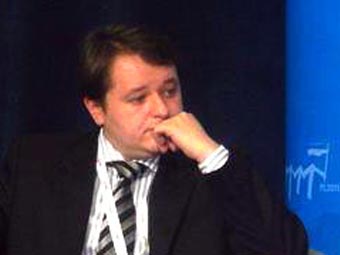Centre for European Transformation has conducted the third comprehensive study in form of monitoring of the implementation of the UNESCO Convention on the Protection and Promotion of the Diversity of Cultural Expressions by the Republic of Belarus.
Can the European Endowment for Democracy conduce to democratization? (Working Document)

The suggestionto create the European Endowment for Democracy (EED) of the European Union [1] is theEU’s obvious reaction to the challenges of the “Arabian Spring”, the crisis of democratic transformations in the majority of the Eastern Partnership countries, and, which is important, the comprehension of the inefficiency (and insufficiency) of the actual democracy supporting tools in the structure of the EU foreign policy. It is necessary to welcome the EU’s steps in the direction of the creation of more effective and flexible financial tools, but, at the same time, the introduction of such mechanisms demands a discussion of some sensitive questions and generalized problems of the influence of the European policy on democratic changes in the Neighborhood countries.
In the joint document of the European Commission and Catherine Ashton, the High Representative of the Union for Foreign Affairs and Security Policy, "A New Response to a Changing Neighborhood" (May, 25th, 2011),a special emphasis is placed on the necessity tosupport the progress in the direction of democracy, in particular - the development of “deep democracy” and establishment of "partnership with societies". It is in this context that the creation of the two new financial tools - Civil Society Facility and European Endowment for Democracy - was announced. These tools are introduced as an addition to the already existing ENPI programs, in particular - EIDHR and NSA-LA, and aimed at compensating the drawbacks of the latter and spurring the expansion of the democracy supporting zones. Therefore, the problematics of the creation and the future of the EED functioning should be considered from at least three angles:
1. The EU democratization policy (and that of other basic international actors), its mechanisms and influence on real changes in the Neighborhood countries;
2. The place and meaning of the EED in the scheme of European and international external development assistance;
3. The EED architecture, principles, and procedures of its functioning.
The first levels provide enough material from the experience of the implementationof political and financial policies of democratization support for the analysis of successes and errors, without which the efficiency of the new tool will be rather doubtful. Further, we focus our attention on «the lessons learned» from the post-communistic transformation processes in the countries of Central and Eastern Europe, the policy of the EU expansion to the East, and the Eastern direction of the Neighborhood Policy. The Eastern vector of the EU policy has its specificity and allows us, due to the historical similarity of the countries of the post-communistic space, to transfer more easily the best practices of transformations from country to country. However, it should not mask the essential distinctions in the ways of transit and the unique specificity of Central Europe, the western sub-region of the USSR (Belarus, Ukraine, Moldova) and Caucasus, and, accordingly, the European policy concerning these geographical regions and sub-regions.
1. Political and financial tools: coincidence and contradictions
The important difference of transformations of the countries of Central Europe and the countries of the Baltic Sea Region is the presence, on the one hand, of the political will of both their governments and nations to integrate into the one European space. On the other hand, this will affected the EU’s basically different political answer to the expression of this will, expressed in the construction of European help to these countries. In a general view, it is possible to say that those financial tools of support were strictly adhered to the political goals and corresponded with them. The PHARE program was directly aimed at supporting the process of these countries’ integration and maximal approach to the European standards in all areas. Unlike PHARE, the TACIS program (operating in the countries which wasn’t candidates for EU membership and do not have such ambitions) was essentially de-politicized. Even though TACIS was based on the European values, its support was infrastructural, i.e. it was separated from a concrete (basically - rhetorically declarative) policy. In the absence of a pro-active policy of EU, the program TACIS and democratization support help from American funds (OSI, NED), funds of the EU member states, and international organizations, acted as a forming tool for civil society and democratic forces of the new countries-neighbors of the EU. Thus, the pitiable condition of democratic changes agents in these countries is, in many respects, the result of the previous policy of support which was in large part devoid of political content.
Not mentioning the peripeteias of the 1990s and 2000s, we shall mark that since the new neighborhood policy (ENP) was proclaimed in 2004 and ENPI was introduced in 2007, there has been a gradual convergence of political and financial tools. The Eastern Partnership brought even more hopes that the EU would return to the region as an active political player, which caused a correction of the financial mechanisms, which had not been quite adequate to political tasks before. In particular, there were an expansion and increase of volumes of financing and a partial simplification of procedures in the programs supporting human rights and developments of civil society (EIDHR, NSA-LA); new tools (cultural program) were introduced; access to a number of European programs (Monet, Tempus, etc.), which had been closed for participation before, was open or widened. The introduction of Civil Society Facility and European Endowment for Democracy is one more logical step in this direction, but this step is entailing number of important problems in implementation.
An obvious, but little discussed moment is that a bigger access to financing and larger volumes of financing per se do not solve the task of democratization at all. To shift the accent from support to “democratization processes” in the EED logic to support "democrats", i.e. from the infrastructure to agents [2], is essentially correct, but it generates a slew of questions. It is necessary to understand:
1) Does support to democrats solve the task of democratization?
2) Who are "democrats" in the EaP countries?
3) What support exactly do they need?
4) How to organize this support so that it would really foster the strengthening of agents of democratization? etc.
2. Antilogous experience of democratic transformations
The history of post-communistic transformations is a set of the most different models of transition to democracy. Moreover, their typological groups and comparison will always be conditional enough. Transformations of the 1980s essentially differed as for their inner actors of changes and structure of external support. It is possible to consider as classical variants the Polish (mass social movement "Solidarity" supportedby the USA and NED) and Czechoslovakian variants (elite "Charter-77" supportedby the Fund "Charter-77", which independently accumulated various types of resources (from donations of private persons to Soros' resources)). A new wave of democratic transformations of the 2000s through «color revolutions» (Serbia, Georgia, Ukraine, and a little earlier - Slovakia (1999)) showed an absolutely other model of democratization. It had no uniform basic movement (similar to "Solidarity" or "Charter-77"); various actors (political parties, public organizations, trade unions, social movements, etc.) found a temporary unity and leaned on the general strategy of democratic changes. Then, practically everywhere, this unity broke up, which in some cases destabilized the new democracies (Ukraine, Georgia)."Color revolutions", in many respects, leaned on external financial resources of furcate (by this time) networks of funds supporting democracy and human rights. The presence of various models of financial support of democratization speaks about the uniqueness of its configuration in each specific case, which questions the possibility of creation of a unified system for all. The same can be said about leading actors of democratic changes as well, i.e. none of successful models can be used as a invariant sample of support of democratic changes in the countries where the democracy deficiency is observed.
Even a richer material for the analysis of problems of the efficiency of external help can be found in the cases of the countries where democratization attempts were not successful. Belarus is traditionally considered the most difficult case and shows a set of negative cases of the influence of financial support and non-reflective experience of transfer of transformational models. Besides, the support of democracy and democrats in authoritarian countries faces rather effective methods of counteraction on the part of hard-boiled political regimes. It is paradoxical but financial support of democratic players can result in the aggravation of the general situation with democracy in the country and close possibilities of positive changes. The policy of financial support of democracy in Belarus has already generated a number of specific problems:
- inefficiency of development programs because their inadequacy to the situation: despite the constant (since 1991) programs of development of civil society, the situation in Belarus’ civil society over the latest 10 years has dramatically worsened, which means that the scheme and ways of implementing development programs are inadequate to the Belarusian situation;
- transformation of lines of activity: international programs of development influence civil society organizations’ and political forces’ choice of directions and subject of activity; the organizations start to write projects aimed at not solving the actual problems of the country and the sector, but choose the subjects and directions, which are most actively financed by international funds and organizations;
- spreadof servile attitudes: in their interaction with donors, organizations start to accept a commercial type of relations where the donor is thought to be anorderer and the organization - as an executor of the ordered services; in such a situation,CSOs and political forces start to refuse their own purposes in favor of the purposes of donor organizations; the "servile" scheme of relations replaces the scheme of partner relations where the donor and the acceptor act as equal parties;
- exclusion from the programsplanning system: the country’sCSOs are excluded for various reasons from the processes of working out and planning programs [3]; as a rule, they deal with already accepted decisions and established priorities;at the stage of the launch and implementation of programs, they cannot affect their adequacy to the situation in the country;
- increase of the role of intermediaries: around Belarus, there is a circle of redistributive funds and organizations; such intermediary structures accumulate the means of large international funds and redistribute them for Belarusan organizations; at the same level, there is a special layer of international experts, specialists on Belarusan matters, etc.; there is a special system of redistribution of financial assets allocated for the solution of the purposes and tasks, which are meant to satisfy the interests of funds and intermediary structures, but which, as a rule, are not coordinated at all with the interests of civil society of the country;
- narrowed spectrum of programs and their possibilities for Belarus: right now Belarus needs more support to innovative solutions taking into account the specificity and features of the Belarusan situation, rather than export of traditional social technologies; while designing and programming the activity of European institutions, it is necessary to transfer the accent from foreign help rendering to the establishment of partner and equal relations between the Belarusan and European stakeholders; and while forming the local (Belarusan) agenda,it is needed to widen the priorities of proposed thematic programs taking into account the actual political, economic, and social situation in the country [4].
- routinisation of the forms and channels of interaction between donors and recipients: over the years of assistance a steady field of actors of democratization was formed, which monopolized their niches. The emergence of new agents is difficult due to the opposition from entrenched actors and donor, the lack of information on local infrastructure and preferences for already proven partners;
- creation of artificial barriers inside civil society and political opposition because of the orientation to different donor resources; creation of an artificial competition between various actors for external resources that limits their possibilities of consolidation; donors’ spread of the clientelism system among political forces and civil society, etc.
With no analysis and correction of these errors, with no elimination of these negative consequences, no new tools are going to bring desirable results, because these will be just reproducing the status quo. In the case of Belarus (and other authoritarian regimes of the Eastern Partnership) this means complementarity of the authoritarian system of democratic agents’ activity. This does not necessarily mean that democrats support with their actions or shared aims and objectives of the dictatorship; this means that the weakness of the democrats doesn’t let them take actions that lead to transformation. In such situation, the opposition political forces and civil society play the role of partial legitimation of the political regime, while creating the facade of alternatives with no real opportunity to change anything. In addition, weak democratic opposition channelizes the protest activity in the forms that are safe enough for autocrats. Modern authoritarian dictatorships need political opposition, being predictable and standardized in its actions. This way, direct financial support for the democrats may not lead to the democratization process.
The solution may be another form of organization of external support which will contribute to disruption of the status quo, i.e., to change of the state of the very democrats and the content of their activities. The conditional approach, which quintessence has become the "more for more" principle, should be extended to the democratic support. Those agents of changes that demonstrate a real ability to change the situation, may claim for support (or its extension), otherwise this support will let the democrats stay afloat, but will not lead them to democratization. By itself, this principle changes the idea of democrats. Democratic agents - it is not as much as those who declare the aims and principles of democracy and undergo oppression for their ideals, but those who really demonstrate the ability of their practical implementation. Problematic thing here is to identify such agents, especially in the presence of widespread, but fundamentally incorrect setting on the export of technologies of democratization from the outside of the country. Such setting covers the opportunity to see new local agents, apart from existing traditional client networks of aid recipients. In fact, there is need to change the angle of view, leaving the formal criteria "to grow into" and to be transformed by the very democratic forces. These criteria, as a minimum, may contain the requirements to: a) presence of their own elaborated strategies and action programs, b) implementation success stories, c) presence of different types of resources (intellectual, organizational, human, material and technical), d) ability to build coalitions and networks of heterogeneous actors (political parties and movements, civil society organizations, think tanks, trade unions, etc.).
3. EED Architecture
To effectively support the democratization process there is need for the establishment of innovative EED architecture. In addition to resolving the issues of flexibility, speed, and de-bureaucratization of support, particular attention must be paid to other issues, in particular to the basic principles and foundations of the EED activity, as well as to its institutional mechanisms. The basic principle that can significantly improve the work efficiency, is using the approximation of support to the local agents of democratic changes. Its implementation mechanisms could be:
- Implementation of the principles of structured dialogue (Paris Declaration of Aid Effectiveness, Accra Agenda Action Agenda) in the practice of EED; creation of system of support coordination with the local agents of change at all levels of decision-making, from preliminary studies to establishment of program goals, implementation and evaluation [5];
- Increasing the understanding of the internal context of countries with a deficit of democracy through special studies as to describe the basic agents and the structure of their relationships (with the mandatory inclusion of local experts and think tanks, as well as the possibility of criticism of the results by independent experts);
- Restrictions on transfer of programs of EED to those agents, foundations, international organizations and NGOs, which have no system of activities coordination with local agents and do not engage local experts into activities of monitoring and evaluation of their programs.
Special attention in the work of EED should be directed to the definition of criteria for selection of support beneficiaries and situations in which such support is necessary. Support, at least, should not contribute to the disintegration of democratic players at the national level and to provoking struggle between them. In order to minimize competition for resources between different types of democratic structures the preference should be given for support of cooperative actions of different agents based on agreed common policies. At the same time, organization of support shall not deny access to aid for new, innovative agents. Civil society and political opposition are developing, and political changes occur. The new instrument should be accompanied by a constant critical examination of the field of actors, should promote their diversification, as well as should be able to respond to new challenges in the future.
1. EED was announced by the European Commission in May, 2011 (See ENP revision), and supported by the EU Council in June, 2011 (See Council Conclusions on the European Neighborhood Policy, 20 June 2011).
2. The EED will add value by supporting key political players in fostering democratic transitions through rapid and flexible assistance. Draft terms of reference for the European Endowment for Democracy
3. It substantially influences Belarus’ isolation for the reasons of infringements of human rights and deficiency of democracy.
4. See also: Resolution of the conference "Strengthening of participation of citizens’ associations and local governments in EU programs: problems and prospects" Minsk, December, 2nd, 2008 [Electronic resource] // International Consortium EUROBELARUS. Informational platform of development of Belarusan-European cooperation and partnership. Access mode: http://eurobelarus.livejournal.com/922.html. - Access date: 01 September 2010.
5. It is possible to create a Local Advisory Group (LAG) model, which is complimented by an EU-level Programming Committee by analogy with the IPA CSF.
Others
-
Civil society in Belarus 2015-2021: from stable development to new challenges
We present a collection of articles “Civil society in Belarus 2015-2021: from stable development to new challenges”.
-
The Belarusian Civil Society: dynamics of change in an unfriendly environment
We present a Discussion paper of dynamics of changes in the Belarusian civil society in 2015-2017.
-
Belarusan human rights defenders’ view on human rights activity and questions of cooperation between Belarusan human rights organizations
We present a research results report of Belarusan human rights organizations sector.
-
Social base of transformation programs in Belarus
We present a sociological research report (abridged version) of social base of transformation programs in Belarus.








Comments
Andrei Yahorau — Al Jazeera: “Lukashenko is irresponsible”
He said Belarus would likely face economic tightening not only as a result of the coronavirus pandemic but also a Russian trade oil crisis that worsened this past winter.